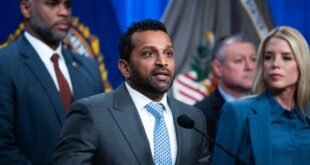In a dramatic turn of events that has sent shockwaves through the halls of Congress and across the American media landscape, Vice President JD Vance found himself at the center of one of the most contentious legislative battles of the year. The high-stakes confrontation unfolded Tuesday as senators engaged in a razor-thin vote that required unprecedented intervention to break a legislative deadlock. The outcome of this crucial moment promises to reshape fundamental aspects of how Americans consume news and information, while triggering intense debates about government spending priorities and the role of publicly funded media in a democratic society.
The Parliamentary Crisis That Demanded Presidential Intervention
The vote was 51-50, with Vice President JD Vance breaking a tie after Sens. Susan Collins (R-Maine), Lisa Murkowski (R-Alaska) and Mitch McConnell (R-Kentucky) broke with their party and voted with Democrats. This dramatic scenario unfolded as the Senate attempted to advance President Trump’s ambitious $9.4 billion rescissions package, a legislative initiative that has become a defining test of the administration’s ability to implement its cost-cutting agenda.
The need for Vance’s intervention highlighted the precarious political dynamics surrounding the proposed cuts, which have divided even Republican senators despite strong White House pressure to maintain party unity. Three rogue Republicans defied the President’s demands for $9 billion cuts. This rebellion within Republican ranks underscored the complexity of the issues at stake and the genuine concerns raised by lawmakers about the far-reaching implications of the proposed spending reductions.
The procedural mechanics of the vote created unprecedented tension in the Senate chamber. The Senate twice deadlocked at 50-50 on procedural votes to begin debate on the controversial bill. In both instances, Vance stepped in to break the tie and push the measure forward. This dual intervention by the Vice President represented an unusual display of executive branch involvement in legislative proceedings, emphasizing the high priority the Trump administration has placed on securing passage of the rescissions package.
The Multi-Billion Dollar Target: Breaking Down the Cuts
The rescissions package represents one of the most significant attempts to claw back previously approved federal spending in recent memory. The rescissions package, approved by the House of Representatives last month, would eliminate approximately $8.3 billion from USAID and $1.1 billion from the Corporation for Public Broadcasting (CPB). These cuts strike at the heart of two distinct but politically sensitive areas of federal spending: international development assistance and domestic public media funding.
The targeting of the US Agency for International Development reflects broader Trump administration skepticism about foreign aid spending and international development programs. The proposed $8.3 billion reduction would significantly curtail America’s ability to respond to global humanitarian crises, support democratic development, and maintain influence through soft power initiatives around the world.
Perhaps even more controversial has been the assault on public broadcasting funding. The cuts would zero out federal funding to the Corporation for Public Broadcasting, the entity that Congress set up almost 60 years ago to distribute grants to public media outlets. This represents a fundamental challenge to the public media infrastructure that has served American communities for decades, providing educational programming, emergency communications, and local news coverage that commercial networks often cannot provide profitably.
Republican Defectors and Their Motivations
The three Republican senators who joined Democrats in opposing the package represent different aspects of concern about the proposed cuts. Their defection created the political crisis that required Vance’s intervention and highlighted the complex considerations beyond simple partisan politics that influenced the vote.
Senator Susan Collins of Maine emerged as one of the most vocal critics of the rescissions approach. Collins defended her “no” vote by arguing that OMB didn’t provide senators with details about what programs would be scrapped as a result of the clawback. Her objections centered on the procedural inadequacies of the proposal and the lack of transparency about its specific impacts.
Collins articulated concerns that extended beyond process to substance. Collins cited $2.5 billion in proposed cuts to the “Development Assistance account,” which she said “covers everything from basic education, to water and sanitation, to food security — but we don’t know how those programs will be affected.” This criticism highlighted the broad scope of international programs that would be affected and the uncertainty about how the cuts would be implemented.
Her position on public broadcasting revealed a more nuanced stance that separated different aspects of the media landscape. “I share the frustration with the biased reporting by NPR, and I would support defunding it. Nevertheless, local TV and radio stations continue to provide important coverage.” This distinction between national public media organizations and local stations reflected concerns about the collateral damage that sweeping cuts might cause to community-level services.
Senator Lisa Murkowski of Alaska brought a different perspective focused on the cumulative impact of repeated legislative battles. “I don’t want us to go from one reconciliation bill to a recissions package to another recissions package to a reconciliation package to a continuing resolution … I don’t accept that. I’m going to be voting no” Her objection reflected broader concerns about the sustainability of governing through constant crisis and confrontation.
The inclusion of Senator Mitch McConnell among the Republican defectors carried particular political significance given his role as a former majority leader and influential voice within the party. His opposition suggested concerns that extended beyond immediate policy disagreements to questions about legislative strategy and long-term political consequences.
The PEPFAR Exception and Strategic Compromises
Recognition of potential political vulnerabilities led to strategic modifications of the original rescissions package. A projected $400 million decrease to the President’s Emergency Plan for AIDS Relief (PEPFAR) program is anticipated to be removed through an amendment before the measure is voted on. This adjustment reflected the political sensitivity of cutting programs with strong bipartisan support and clear humanitarian benefits.
Senate Majority Leader John Thune acknowledged the political necessity of this compromise. “There was a lot of interest among our members in doing something on the PEPFAR issue. So that’s reflected in the substitute, and we hope that if we can get this across the finish line in the Senate, the House will accept that one small modification.” The PEPFAR program, initiated during the George W. Bush administration, has maintained strong Republican and Democratic support due to its demonstrated success in combating HIV/AIDS in Africa and other regions.
The strategic decision to preserve PEPFAR funding while eliminating other international aid programs reflected careful political calculation. Among the expected changes is a GOP-backed amendment to preserve about $400 million in funding for the President’s Emergency Plan for AIDS Relief (PEPFAR), a Bush-era program aimed at combating HIV/AIDS globally. The proposed carveout has White House support and was seen as necessary to shore up wavering GOP votes.
The Katherine Maher Factor: A Lightning Rod for Controversy
The debate over public broadcasting funding has been significantly influenced by the controversial tenure of NPR CEO Katherine Maher, whose background and public statements have provided ammunition for critics of public media. Rep. Jim Jordan, R-Ohio, pointed to Berliner’s accusation that “in the D.C. area editorial positions at NPR, he said he found 87 registered Democrats, 0 Republicans.” This statistical imbalance has become a central talking point for Republicans arguing that NPR cannot provide balanced coverage.
Maher’s previous statements and social media posts have created additional political liabilities for public broadcasting advocates. “You called him a deranged racist and sociopath. You posted on X that America is addicted to white supremacy. You’ve publicly chastised using the phrase boy and girl, which you said erases the language for non-binary people.” These comments, made before her appointment to NPR, have been repeatedly cited by Republicans as evidence of the ideological bias they argue pervades public media.
Perhaps most damaging to public broadcasting’s cause have been Maher’s statements about free speech and information control. “In 2021, you called the First Amendment the No. 1 challenge in American journalism because it makes it hard to crack down on bad information. You said in a Ted Talk that our reverence for the truth might be a distraction. You’ve also expressed support for deplatforming individuals you view as fascist.” These positions have provided critics with substantive grounds for questioning whether public broadcasters can be trusted with taxpayer funding.
The Congressional Accountability Moment
The House DOGE subcommittee hearing featuring Maher and PBS CEO Paula Kerger became a focal point for broader debates about media bias and government funding. “Anti-American Airwaves: Holding the heads of NPR and PBS Accountable,” the hearing’s provocative title reflected the combative atmosphere surrounding public broadcasting funding debates.
The hearing revealed the depth of Republican frustration with public media coverage. “People who listen to NPR are totally misinformed,” Rep. James Comer (R-Ky.) said during his questioning. “I have a problem with that, because you get federal funds.” This criticism reflected broader conservative arguments that taxpayer-funded media should not promote particular political perspectives.
Republican committee members pressed Maher on specific coverage decisions that they argued demonstrated bias. “You guys were 0-for-3 on three of the biggest stories in the country,” Rep. Jim Jordan (R-Ohio) exclaimed as he admonished the NPR chief. The reference encompassed NPR’s coverage of the Hunter Biden laptop story, COVID-19 origins, and Trump-Russia investigations.
Maher’s responses during the hearing included acknowledgments of past mistakes while defending NPR’s overall approach. “Our current editorial leadership believe that was a mistake, as do I,” she said regarding NPR’s handling of the Hunter Biden laptop story. However, these concessions did little to satisfy Republican critics who viewed them as insufficient given the scope of their concerns about public media bias.
Bill Maher’s Unexpected Support for Cuts
The debate over public broadcasting funding received an unexpected boost from an unlikely source when comedian and HBO host Bill Maher endorsed the effort to strip federal funding from NPR and PBS. His support carried particular weight given his typically liberal political positions and his lack of obvious partisan motivation for opposing public media.
Bill Maher’s endorsement came after witnessing Katherine Maher’s congressional testimony and learning about the editorial staff composition at NPR. The revelation that NPR’s editorial staff included 87 registered Democrats and zero registered Republicans appeared to influence his assessment of whether the organization could maintain editorial balance.
During his “Overtime” segment, Bill Maher argued that the congressional hearing had made a compelling case for privatizing both NPR and PBS. His criticism focused particularly on Katherine Maher’s suggestion that the organizations could remain impartial despite the overwhelming partisan imbalance within their newsrooms. The comedian’s support for defunding represented a significant departure from typical liberal positions on public media.
Rural and Community Impact Considerations
The debate over public broadcasting cuts has highlighted the particular importance of public media in rural and underserved communities. Federal funding makes up about 15 percent of PBS’s budget and 1 percent of NPR’s budget, but member stations are more vulnerable. The cuts could shutter some small radio stations, which are sometimes the only way of getting out emergency messages in rural areas.
This rural impact consideration influenced some Republican senators who might otherwise support the cuts. Another Republican who was worried about the cuts, Sen. Mike Rounds (South Dakota), said Tuesday that he would vote for the package after the White House agreed to transfer millions of dollars to the Interior Department for tribal radio stations. The special provision for tribal broadcasting reflected recognition of the unique role that public media plays in serving Native American communities.
The emergency services aspect of public broadcasting has provided one of the strongest arguments for maintaining federal support. Collins specifically noted that CPB money in Maine supports the state’s emergency alert system and enables coverage of local events like high school basketball games that commercial networks typically ignore.
Legislative Timeline and Political Pressure
The rescissions package operates under significant time constraints that have intensified political pressure on all participants. The House has until Friday to concur on the vote. This tight deadline has forced rapid decision-making and limited opportunities for extended negotiations or compromise approaches.
President Trump has personally engaged in lobbying efforts to secure passage of the rescissions package. “It is very important that all Republicans adhere to my Recissions Bill and, in particular, DEFUND THE CORPORATION FOR PUBLIC BROADCASTING (PBS and NPR), which is worse than CNN & MSDNC put together.” The direct presidential pressure has created additional political stakes for Republican senators considering their positions.
The procedural structure of the legislative process has created multiple opportunities for dramatic votes and tie-breaking interventions. Senate Starts “Vote-A-Rama” As It Heads For Final Roll Call describes the marathon voting session that follows initial passage, during which numerous amendments can be offered and additional tie-breaking votes may be required.
The Broader Philosophy: Government Funding and Media Independence
The rescissions debate reflects deeper philosophical questions about the appropriate relationship between government and media in American democracy. Republicans have long sought to eliminate public media funding, but Trump and his allies have targeted programming for an alleged liberal bias. This targeting raises questions about whether funding decisions should be based on content preferences or broader principles about media independence.
Critics of public broadcasting argue that government funding inevitably compromises editorial independence, even when formal firewalls exist between funding and editorial decisions. The statistical imbalance in newsroom political affiliations provides empirical support for these concerns, suggesting that cultural and ideological influences may shape coverage even without direct government interference.
Defenders of public broadcasting counter that the funding model provides independence from commercial pressures and advertising influence that can compromise journalism quality. They argue that the diversity of funding sources, including federal support, membership donations, and corporate underwriting, creates a more balanced approach than pure commercial or government models.
Economic and Business Model Implications
The potential elimination of federal funding would force fundamental changes in public broadcasting business models. Federal funding makes up about 15 percent of PBS’s budget and 1 percent of NPR’s budget, but member stations are more vulnerable. While national organizations might survive through increased fundraising and membership drives, local stations face more serious threats to their viability.
The economic impact extends beyond immediate budget shortfalls to questions about long-term sustainability and mission focus. Public stations currently balance local community service with national programming, educational content with news coverage, and commercial considerations with public service obligations. Eliminating federal funding would likely force more commercial approaches that could compromise public service aspects of their missions.
Looking Forward: Implementation and Consequences
If the rescissions package ultimately passes both chambers of Congress, implementation will present significant practical challenges. The lack of detailed guidance about how cuts should be implemented has concerned even some supporters of the overall approach, suggesting that administrative decisions about program termination could become additional sources of political controversy.
The international aid cuts would require careful coordination with partner organizations and recipient countries to minimize humanitarian disruptions. The scale of the USAID reduction suggests that some programs would need to be terminated entirely rather than simply reduced, potentially affecting ongoing commitments and relationships.
For public broadcasting, the elimination of federal funding would trigger a fundamental restructuring of the entire public media ecosystem. The cuts could shutter some small radio stations, which are sometimes the only way of getting out emergency messages in rural areas. The community impact of these closures could extend far beyond media consumption to affect emergency preparedness and civic engagement.
The Political Stakes and Future Implications
Vance’s tie-breaking votes represent more than procedural interventions; they symbolize the Trump administration’s commitment to implementing its vision of reduced government spending and restructured federal priorities. The success or failure of the rescissions package will likely influence future efforts to reduce federal spending and could establish precedents for how aggressively the administration pursues spending cuts.
The Republican defections highlight ongoing tensions within the party about governing philosophy and political strategy. The willingness of experienced senators like McConnell to oppose White House priorities suggests that traditional Republican concerns about fiscal responsibility and government effectiveness sometimes conflict with more aggressive cost-cutting approaches.
For public broadcasting, the outcome of this legislative battle will determine whether the public media system that has served American communities for nearly six decades can survive in its current form. The debate has exposed fundamental questions about the role of government in supporting journalism and educational programming that may continue to influence media policy regardless of the immediate legislative outcome.
As the Senate continues its deliberations and moves toward final votes, the historic nature of Vance’s intervention and the broader implications of the rescissions package ensure that this legislative battle will be remembered as a defining moment in debates about government spending, media independence, and the appropriate role of federal support for public services in American democracy.


